- Home
- Roald Dahl
Innocence Page 2
Innocence Read online
Page 2
I promise you that if somebody had caught me by the shoulder at that moment and said to me, ‘What is your greatest wish in life, little boy? What is your absolute ambition? To be a doctor? A fine musician? A painter? A writer? Or the Lord Chancellor?’ I would have answered without hesitation that my only ambition, my hope, my longing was to have a bike like that and to go whizzing down the hill with no hands on the handlebars. It would be fabulous. It made me tremble just to think about it.
My second and only other memory of Llandaff Cathedral School is extremely bizarre. It happened a little over a year later, when I was just nine. By then I had made some friends and when I walked to school in the mornings I would start out alone but would pick up four other boys of my own age along the way. After school was over, the same four boys and I would set out together across the village green and through the village itself, heading for home. On the way to school and on the way back we always passed the sweet-shop. No we didn’t, we never passed it. We always stopped. We lingered outside its rather small window gazing in at the big glass jars full of Bull’s-eyes and Old Fashioned Humbugs and Strawberry Bonbons and Glacier Mints and Acid Drops and Pear Drops and Lemon Drops and all the rest of them. Each of us received sixpence a week for pocket-money, and whenever there was any money in our pockets, we would all troop in together to buy a pennyworth of this or that. My own favourites were Sherbet Suckers and Liquorice Bootlaces.
One of the other boys, whose name was Thwaites, told me I should never eat Liquorice Bootlaces. Thwaites’s father, who was a doctor, had said that they were made from rats’ blood. The father had given his young son a lecture about Liquorice Bootlaces when he had caught him eating one in bed. ‘Every ratcatcher in the country’, the father had said, ‘takes his rats to the Liquorice Bootlace Factory, and the manager pays tuppence for each rat. Many a ratcatcher has become a millionaire by selling his dead rats to the Factory.’
‘But how do they turn the rats into liquorice?’ the young Thwaites had asked his father.
‘They wait until they’ve got ten thousand rats,’ the father had answered, ‘then they dump them all into a huge shiny steel cauldron and boil them up for several hours. Two men stir the bubbling cauldron with long poles and in the end they have a thick steaming rat-stew. After that, a cruncher is lowered into the cauldron to crunch the bones, and what’s left is a pulpy substance called rat-mash.’
‘Yes, but how do they turn that into Liquorice Bootlaces, Daddy?’ the young Thwaites had asked, and this question, according to Thwaites, had caused his father to pause and think for a few moments before he answered it. At last he had said, ‘The two men who were doing the stirring with the long poles now put on their wellington boots and climb into the cauldron and shovel the hot rat-mash out on to a concrete floor. Then they run a steam-roller over it several times to flatten it out. What is left looks rather like a gigantic black pancake, and all they have to do after that is to wait for it to cool and to harden so they can cut it up into strips to make the Bootlaces. Don’t ever eat them,’ the father had said. ‘If you do, you’ll get ratitis.’
‘What is ratitis, Daddy?’ young Thwaites had asked.
‘All the rats that the rat-catchers catch are poisoned with rat-poison,’ the father had said. ‘It’s the rat-poison that gives you ratitis.’
‘Yes, but what happens to you when you catch it?’ young Thwaites had asked.
‘Your teeth become very sharp and pointed,’ the father had answered. ‘And a short stumpy tail grows out of your back just above your bottom. There is no cure for ratitis. I ought to know. I’m a doctor.’
We all enjoyed Thwaites’s story and we made him tell it to us many times on our walks to and from school. But it didn’t stop any of us except Thwaites from buying Liquorice Bootlaces. At two for a penny they were the best value in the shop. A Bootlace, in case you haven’t had the pleasure of handling one, is not round. It’s like a flat black tape about half an inch wide. You buy it rolled up in a coil, and in those days it used to be so long that when you unrolled it and held one end at arm’s length above your head, the other end touched the ground.
Sherbet Suckers were also two a penny. Each Sucker consisted of a yellow cardboard tube filled with sherbet powder, and there was a hollow liquorice straw sticking out of it. (Rat’s blood again, young Thwaites would warn us, pointing at the liquorice straw.) You sucked the sherbet up through the straw and when it was finished you ate the liquorice. They were delicious, those Sherbet Suckers. The sherbet fizzed in your mouth, and if you knew how to do it, you could make white froth come out of your nostrils and pretend you were throwing a fit.
Gobstoppers, costing a penny each, were enormous hard round balls the size of small tomatoes. One Gobstopper would provide about an hour’s worth of non-stop sucking and if you took it out of your mouth and inspected it every five minutes or so, you would find it had changed colour. There was something fascinating about the way it went from pink to blue to green to yellow. We used to wonder how in the world the Gobstopper Factory managed to achieve this magic. ‘How does it happen?’ we would ask each other. ‘How can they make it keep changing colour?’
‘It’s your spit that does it,’ young Thwaites proclaimed. As the son of a doctor, he considered himself to be an authority on all things that had to do with the body. He could tell us about scabs and when they were ready to be picked off. He knew why a black eye was blue and why blood was red. ‘It’s your spit that makes a Gobstopper change colour,’ he kept insisting. When we asked him to elaborate on this theory, he answered, ‘You wouldn’t understand it if I did tell you.’
Pear Drops were exciting because they had a dangerous taste. They smelled of nail-varnish and they froze the back of your throat. All of us were warned against eating them, and the result was that we ate them more than ever.
Then there was a hard brown lozenge called the Tonsil Tickler. The Tonsil Tickler tasted and smelled very strongly of chloroform. We had not the slightest doubt that these things were saturated in the dreaded anaesthetic which, as Thwaites had many times pointed out to us, could put you to sleep for hours at a stretch. ‘If my father has to saw off somebody’s leg,’ he said, ‘he pours chloroform on to a pad and the person sniffs it and goes to sleep and my father saws his leg off without him even feeling it.’
‘But why do they put it into sweets and sell them to us?’ we asked him.
You might think a question like this would have baffled Thwaites. But Thwaites was never baffled. ‘My father says Tonsil Ticklers were invented for dangerous prisoners in jail,’ he said. ‘They give them one with each meal and the chloroform makes them sleepy and stops them rioting.’
‘Yes,’ we said, ‘but why sell them to children?’
‘It’s a plot,’ Thwaites said. ‘A grown-up plot to keep us quiet.’
The sweet-shop in Llandaff in the year 1923 was the very centre of our lives. To us, it was what a bar is to a drunk, or a church is to a Bishop. Without it, there would have been little to live for. But it had one terrible drawback, this sweet-shop. The woman who owned it was a horror. We hated her and we had good reason for doing so.
Her name was Mrs Pratchett. She was a small skinny old hag with a moustache on her upper lip and a mouth as sour as a green gooseberry. She never smiled. She never welcomed us when we went in, and the only times she spoke were when she said things like, ‘I’m watchin’ you so keep yer thievin’ fingers off them chocolates!’ Or ‘I don’t want you in ’ere just to look around! Either you forks out or you gets out!’
But by far the most loathsome thing about Mrs Pratchett was the filth that clung around her. Her apron was grey and greasy. Her blouse had bits of breakfast all over it, toast-crumbs and tea stains and splotches of dried eggyolk. It was her hands, however, that disturbed us most. They were disgusting. They were black with dirt and grime. They looked as though they had been putting lumps of coal on the fire all day long. And do not forget please that it was these very hands and fingers that s
he plunged into the sweet-jars when we asked for a pennyworth of Treacle Toffee or Wine Gums or Nut Clusters or whatever. There were precious few health laws in those days, and nobody, least of all Mrs Pratchett, ever thought of using a little shovel for getting out the sweets as they do today. The mere sight of her grimy right hand with its black fingernails digging an ounce of Chocolate Fudge out of a jar would have caused a starving tramp to go running from the shop. But not us. Sweets were our life-blood. We would have put up with far worse than that to get them. So we simply stood and watched in sullen silence while this disgusting old woman stirred around inside the jars with her foul fingers.
The other thing we hated Mrs Pratchett for was her meanness. Unless you spent a whole sixpence all in one go, she wouldn’t give you a bag. Instead you got your sweets twisted up in a small piece of newspaper which she tore off a pile of old Daily Mirrors lying on the counter.
So you can well understand that we had it in for Mrs Pratchett in a big way, but we didn’t quite know what to do about it. Many schemes were put forward but none of them was any good. None of them, that is, until suddenly, one memorable afternoon, we found the dead mouse.
The Great Mouse Plot
My four friends and I had come across a loose floor-board at the back of the classroom, and when we prised it up with the blade of a pocket-knife, we discovered a big hollow space underneath. This, we decided, would be our secret hiding place for sweets and other small treasures such as conkers and monkey-nuts and birds’ eggs. Every afternoon, when the last lesson was over, the five of us would wait until the classroom had emptied, then we would lift up the floor-board and examine our secret hoard, perhaps adding to it or taking something away.
One day, when we lifted it up, we found a dead mouse lying among our treasures. It was an exciting discovery. Thwaites took it out by its tail and waved it in front of our faces. ‘What shall we do with it?’ he cried.
‘It stinks!’ someone shouted. ‘Throw it out of the window quick!’
‘Hold on a tick,’ I said. ‘Don’t throw it away.’
Thwaites hesitated. They all looked at me.
When writing about oneself, one must strive to be truthful. Truth is more important than modesty. I must tell you, therefore, that it was I and I alone who had the idea for the great and daring Mouse Plot. We all have our moments of brilliance and glory, and this was mine.
‘Why don’t we’, I said, ‘slip it into one of Mrs Pratchett’s jars of sweets? Then when she puts her dirty hand in to grab a handful, she’ll grab a stinky dead mouse instead.’
The other four stared at me in wonder. Then, as the sheer genius of the plot began to sink in, they all started grinning. They slapped me on the back. They cheered me and danced around the classroom. ‘We’ll do it today!’ they cried. ‘We’ll do it on the way home! You had the idea,’ they said to me, ‘so you can be the one to put the mouse in the jar.’
Thwaites handed me the mouse. I put it into my trouser pocket. Then the five of us left the school, crossed the village green and headed for the sweet-shop. We were tremendously jazzed up. We felt like a gang of desperados setting out to rob a train or blow up the sheriff’s office.
‘Make sure you put it into a jar which is used often,’ somebody said.
‘I’m putting it in Gobstoppers,’ I said. ‘The Gobstopper jar is never behind the counter.’
‘I’ve got a penny,’ Thwaites said, ‘so I’ll ask for one Sherbet Sucker and one Bootlace. And while she turns away to get them, you slip the mouse in quickly with the Gobstoppers.’
Thus everything was arranged. We were strutting a little as we entered the shop. We were the victors now and Mrs Pratchett was the victim. She stood behind the counter, and her small malignant pig-eyes watched us suspiciously as we came forward.’
‘One Sherbet Sucker, please,’ Thwaites said to her, holding out his penny.
I kept to the rear of the group, and when I saw Mrs Pratchett turn her head away for a couple of seconds to fish a Sherbet Sucker out of the box, I lifted the heavy glass lid of the Gobstopper jar and dropped the mouse in. Then I replaced the lid as silently as possible. My heart was thumping like mad and my hands had gone all sweaty.
‘And one Bootlace, please,’ I heard Thwaites saying. When I turned round, I saw Mrs Pratchett holding out the Bootlace in her filthy fingers.
‘I don’t want all the lot of you troopin’ in ’ere if only one of you is buyin’,’ she screamed at us. ‘Now beat it! Go on, get out!’
As soon as we were outside, we broke into a run. ‘Did you do it?’ they shouted at me.
‘Of course I did!’ I said.
‘Well done you!’ they cried. ‘What a super show!’
I felt like a hero. I was a hero. It was marvellous to be so popular.
Mr Coombes
The flush of triumph over the dead mouse was carried forward to the next morning as we all met again to walk to school.
‘Let’s go in and see if it’s still in the jar,’ somebody said as we approached the sweet-shop.
‘Don’t,’ Thwaites said firmly. ‘It’s too dangerous. Walk past as though nothing has happened.’
As we came level with the shop we saw a cardboard notice hanging on the door.
We stopped and stared. We had never known the sweet-shop to be closed at this time in the morning, even on Sundays.
‘What’s happened?’ we asked each other. ‘What’s going on?’
We pressed our faces against the window and looked inside. Mrs Pratchett was nowhere to be seen.
‘Look!’ I cried. ‘The Gobstopper jar’s gone! It’s not on the shelf! There’s a gap where it used to be!’
‘It’s on the floor!’ someone said. ‘It’s smashed to bits and there’s Gobstoppers everywhere!’
‘There’s the mouse!’ someone else shouted.
We could see it all, the huge glass jar smashed to smithereens with the dead mouse lying in the wreckage and hundreds of many-coloured Gobstoppers littering the floor.
‘She got such a shock when she grabbed hold of the mouse that she dropped everything,’ somebody was saying.
‘But why didn’t she sweep it all up and open the shop?’ I asked.
Nobody answered me.
We turned away and walked towards the school. All of a sudden we had begun to feel slightly uncomfortable. There was something not quite right about the shop being closed. Even Thwaites was unable to offer a reasonable explanation. We became silent. There was a faint scent of danger in the air now. Each one of us had caught a whiff of it. Alarm bells were beginning to ring faintly in our ears.
After a while, Thwaites broke the silence. ‘She must have got one heck of a shock,’ he said. He paused. We all looked at him, wondering what wisdom the great medical authority was going to come out with next.
‘After all,’ he went on, ‘to catch hold of a dead mouse when you’re expecting to catch hold of a Gobstopper must be a pretty frightening experience. Don’t you agree?’
Nobody answered him.
‘Well now,’ Thwaites went on, ‘when an old person like Mrs Pratchett suddenly gets a very big shock, I suppose you know what happens next?’
‘What?’ we said. ‘What happens?’
‘You ask my father,’ Thwaites said. ‘He’ll tell you.’
‘You tell us,’ we said.
‘It gives her a heart attack,’ Thwaites announced. ‘Her heart stops beating and she’s dead in five seconds.’
For a moment or two my own heart stopped beating. Thwaites pointed a finger at me and said darkly, ‘I’m afraid you’ve killed her.’
‘Me?’ I cried. ‘Why just me?’
‘It was your idea,’ he said. ‘And what’s more, you put the mouse in.’
All of a sudden, I was a murderer.
At exactly that point, we heard the school bell ringing in the distance and we had to gallop the rest of the way so as not to be late for prayers.
Prayers were held in the Assembly Hall. We all perc
hed in rows on wooden benches while the teachers sat up on the platform in armchairs, facing us. The five of us scrambled into our places just as the Headmaster marched in, followed by the rest of the staff.
The Headmaster is the only teacher at Llandaff Cathedral School that I can remember, and for a reason you will soon discover, I can remember him very clearly indeed. His name was Mr Coombes and I have a picture in my mind of a giant of a man with a face like a ham and a mass of rusty-coloured hair that sprouted in a tangle all over the top of his head. All grown-ups appear as giants to small children. But Headmasters (and policemen) are the biggest giants of all and acquire a marvellously exaggerated stature. It is possible that Mr Coombes was a perfectly normal being, but in my memory he was a giant, a tweed-suited giant who always wore a black gown over his tweeds and a waistcoat under his jacket.
Mr Coombes now proceeded to mumble through the same old prayers we had every day, but this morning, when the last amen had been spoken, he did not turn and lead his group rapidly out of the Hall as usual. He remained standing before us, and it was clear he had an announcement to make.

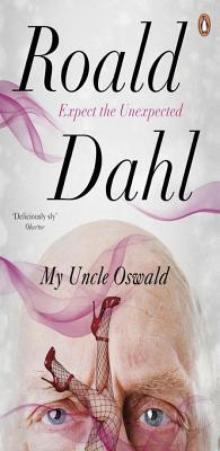 My Uncle Oswald
My Uncle Oswald The Best of Roald Dahl
The Best of Roald Dahl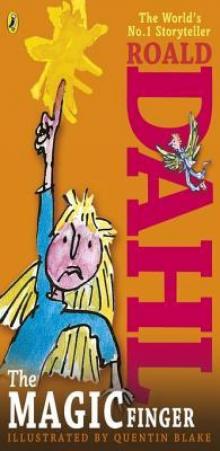 The Magic Finger
The Magic Finger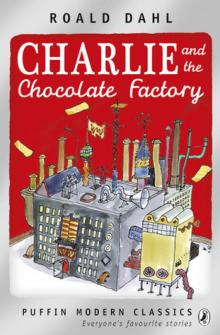 Charlie and the Chocolate Factory
Charlie and the Chocolate Factory Fantastic Mr Fox
Fantastic Mr Fox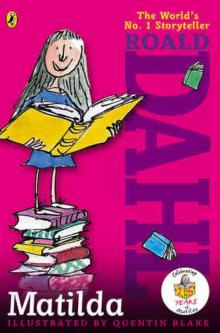 Matilda
Matilda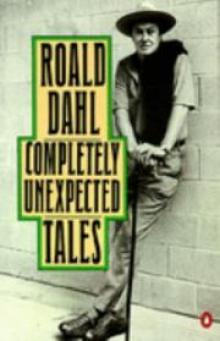 Completely Unexpected Tales: Tales of the Unexpected. More Tales of the Unexpected
Completely Unexpected Tales: Tales of the Unexpected. More Tales of the Unexpected The Wonderful Story of Henry Sugar and Six More
The Wonderful Story of Henry Sugar and Six More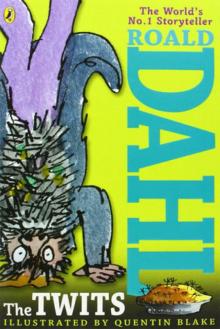 The Twits
The Twits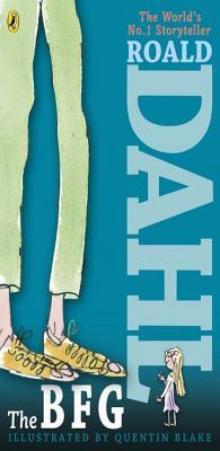 The BFG
The BFG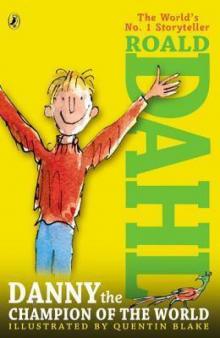 Danny the Champion of the World
Danny the Champion of the World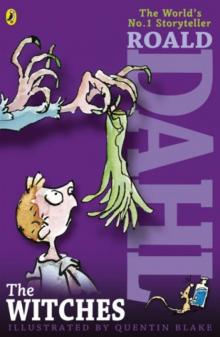 The Witches
The Witches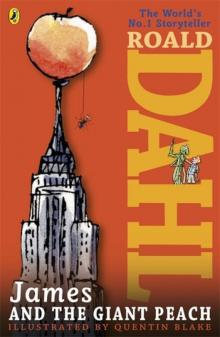 James and the Giant Peach
James and the Giant Peach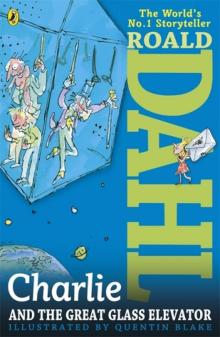 Charlie and the Great Glass Elevator
Charlie and the Great Glass Elevator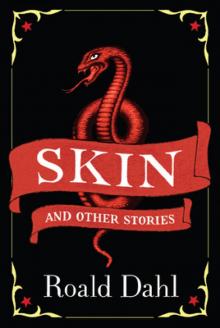 Skin and Other Stories
Skin and Other Stories Kiss Kiss
Kiss Kiss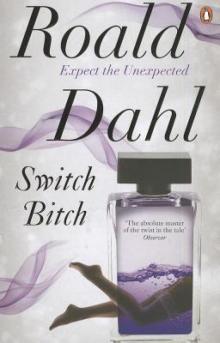 Switch Bitch
Switch Bitch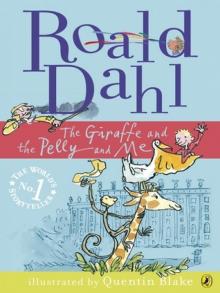 The Giraffe and the Pelly and Me
The Giraffe and the Pelly and Me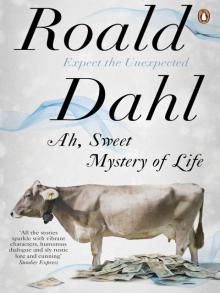 Ah, Sweet Mystery of Life
Ah, Sweet Mystery of Life Fear
Fear The Great Automatic Grammatizator and Other Stories
The Great Automatic Grammatizator and Other Stories Someone Like You
Someone Like You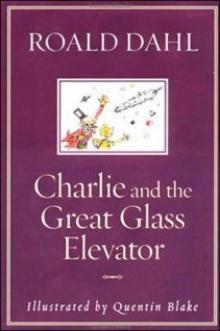 Charlie and the Great Glass Elevator c-2
Charlie and the Great Glass Elevator c-2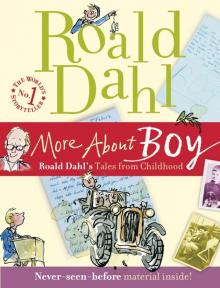 More About Boy
More About Boy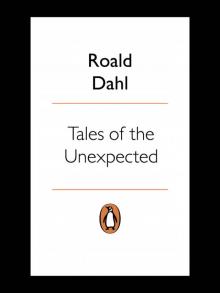 Tales of the Unexpected
Tales of the Unexpected The Umbrella Man and Other Stories
The Umbrella Man and Other Stories Dirty Beasts
Dirty Beasts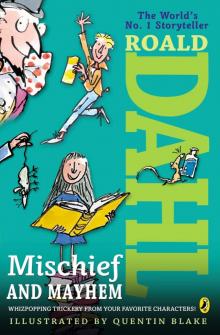 Roald Dahl's Mischief and Mayhem
Roald Dahl's Mischief and Mayhem The Collected Short Stories of Roald Dahl, Volume 1
The Collected Short Stories of Roald Dahl, Volume 1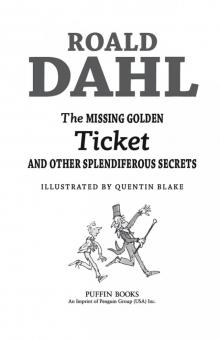 The Missing Golden Ticket and Other Splendiferous Secrets
The Missing Golden Ticket and Other Splendiferous Secrets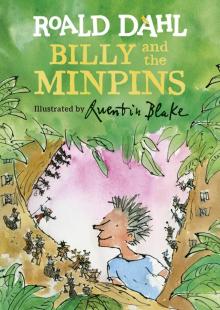 Billy and the Minpins
Billy and the Minpins Over to You
Over to You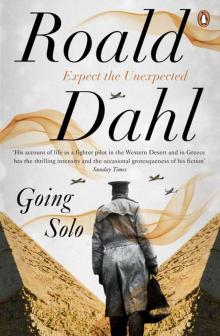 Going Solo
Going Solo Deception
Deception War
War Man from the South ee-3
Man from the South ee-3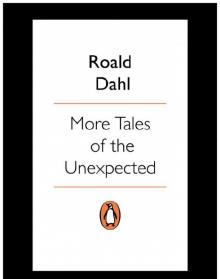 More Tales of the Unexpected
More Tales of the Unexpected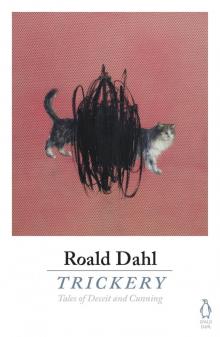 Trickery
Trickery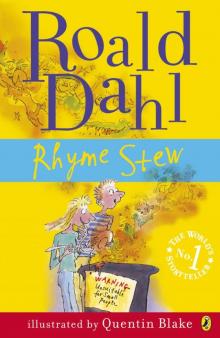 Rhyme Stew
Rhyme Stew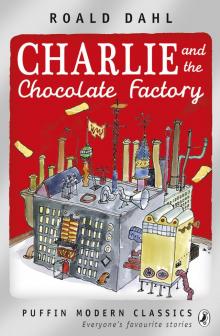 Charlie and the Chocolate Factory (Puffin Modern Classics relaunch)
Charlie and the Chocolate Factory (Puffin Modern Classics relaunch)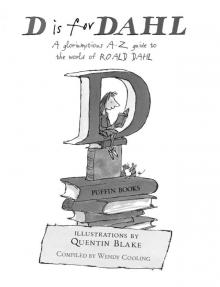 D is for Dahl
D is for Dahl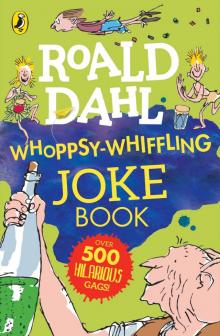 Roald Dahl Whoppsy-Whiffling Joke Book
Roald Dahl Whoppsy-Whiffling Joke Book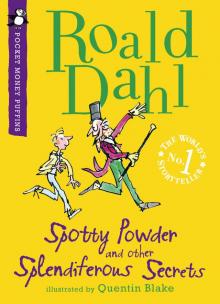 Spotty Powder and other Splendiferous Secrets
Spotty Powder and other Splendiferous Secrets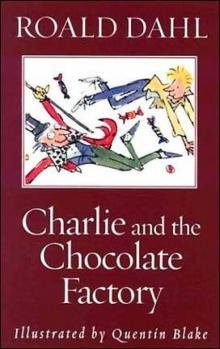 Charlie and the Chocolate Factory c-1
Charlie and the Chocolate Factory c-1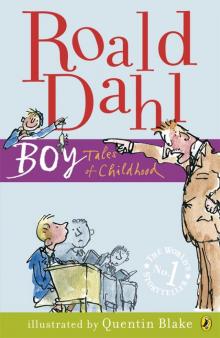 Boy
Boy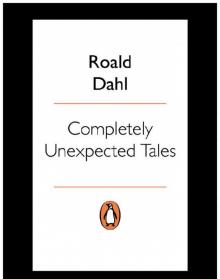 Completely Unexpected Tales
Completely Unexpected Tales Madness
Madness Innocence
Innocence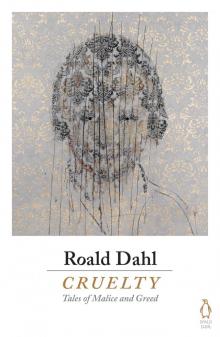 Cruelty
Cruelty George's Marvellous Medicine
George's Marvellous Medicine